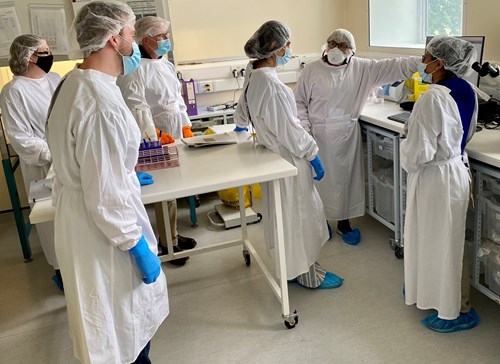iPSC cell culture training

Human iPSCs have the potential to revolutionise in vitro life science research. The techniques for iPSC growth and quality control are highly specialised and it is therefore important that the ECACC team is provided with comprehensive and up-to-date training in these procedures to enable the maintenance of our iPSC portfolio. It was with great pleasure that we were able to welcome two renowned iPSC specialists to ECACC in May of this year: Lyn Healy, Senior Research Scientist from the Francis Crick Institute and Minal Patel, Senior Scientific Manager from the Wellcome Trust Sanger Institute. Lyn and Minal provided a week of comprehensive and in-depth iPSC training to ECACC scientists. This enjoyable and informative course covered both theoretical and practical hands-on training.
The ECACC team has a varied knowledge of iPSC cell culture, from never having worked with them before, to having a background knowledge of stem cell biology from PhD and post-doctoral work, to having been trained previously but requiring ‘refresher’ training from the start of the procedure to the end. All of our course participants had worked with multiple ‘traditional’ cell lines during our time at ECACC and the prospect for us to learn how to resuscitate, culture, split, pick colonies, and freeze stem cells from two experts in the field was an opportunity we couldn’t pass up.
On the week commencing 9 May 2022, Minal Patel from the Sanger Centre and Lyn Healy from The Francis Crick Institute came to ECACC for 1 week to share their expertise. The course consisted of a mixture of practical and theory sessions about different aspects of iPSC cell culture. The theory sessions were focused on what iPSCs are, how to characterize them with different analyses, what their different culture conditions are, how we can assess pluripotency, direct differentiation assay, and different QC testing. The practical sessions included coating plates, thawing iPSCs, culturing/passaging them in Vitronectin and Matrigel, picking iPSCs from a largely differentiated plate, trilineage differentiation, and cryopreservation. Every day ended with a ‘Tips and Tricks’ session where we could consolidate our new-found knowledge, ask any questions that we had and learn the ‘tricks of the trade’ for certain aspects of iPSC culture.
A few highlights from the course participants were:
“Personally, I found the knowledge of how to pick colonies of iPSCs from a plate that had a large amount of differentiated cell growth very useful. While obviously it is advisable not to let cells get to this stage, if it did happen with an iPSC line that was precious and irreplaceable, it is a skill that I am glad to possess to ‘save’ the culture. In terms of the theory sessions of iPSC cell culture I particularly enjoyed learning about the Feeder-Dependent / Feeder-Independent IPSC culture.”
“The highlight of the training for me was to be able to witness the growth and division of the cells on a daily basis. It was fascinating to learn how to differentiate iPSCs as differentiated iPSCs can be useful as models to better understand disease mechanisms or in drug discovery on specific cell types and tissues.”
“I enjoyed consolidating the practical training I had previously done and learning techniques that I hadn’t yet been shown. I particularly liked learning about what the ROCK inhibitor (ROCKi) or Y27632 reagent does, when and why to use or not use it while culturing iPSC cell lines. One use of ROCKi is to increase the survival rate of iPSC cells after resuscitation from frozen as it stops single cell dissociation-induced apoptosis (death).”
This whole experience was very rewarding for the ECACC staff. We are looking forward to applying what we have learned to ensure our procedures are of the highest standard.
Written by the ECACC team test
